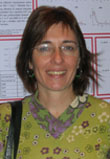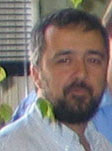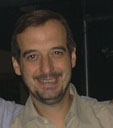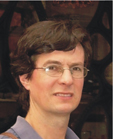
 Dra. Laura Castro
Dra. Laura Castro
Dr L. Castro (born in September 18th, 1966) completed her training in Medicine in 1994 at the School of Medicine, of the Universidad de la República, Montevideo, Uruguay. As a medical student, she jointed Dr Eugenio Prodanov’s Free Radicals research group at the Biochemistry Department in the School of Medicine while she had a fellowship from the National Research Council for young investigators. Dr L Castro has performed her post-doctoral training at the Department of Anesthesiology, University of Alabama at Birmingham, USA in Dr. Bruce A. Freeman’s Laboratory from 1999 to 2001. Since then, she returned to the School of Medicine in Uruguay where currently holds an Associate Professor position at the Biochemistry Department.
Dr Castro research interests are related to the chemistry, enzymology, metabolism of reactive oxygen and nitrogen species and the free radical-mediated damage and antioxidant interventions to biological systems. Particularly, she has been studied the reactions of nitric oxide and peroxynitrite with mitochondrial proteins with isolated proteins and cellular models.
 Dra. Silvia Chifflet
Dra. Silvia Chifflet
Silvia Chifflet, MD (1980), PhD (1995), Universidad de la República, Uruguay. Research Fellow, Columbia University, New York (1983-1984); Invited Associate Professor, Cornell University, NewYork (1994-1995). Assistant Professor of Cell Biology, Facultad de Ciencias Universidad de la República, Uruguay (1990-1996). Present position, Associate Professor of Biochemistry, Facultad de Medicina, Universidad de la República, Uruguay.
One of the main objectives of our research group is to study the molecular nature of the mechanisms mediating the interactions between the plasma membrane potential (PMP) and the organization of the cytoskeleton in transport epithelia. In this respect, we have shown that modifications in the PMP of several cultured epithelia exhibiting well-developed adherens junctions provoke characteristic changes of the actin and tubulin cytoskeletons. As a physiological implication of these findings we have also reported that PMP depolarization occurs at the leading edge cells in wounds of corneal endothelial cell monolayers. This spontaneous depolarization participates in the development of the characteristic actin reorganization experienced by the healing cells. In this latter work we have also communicated results showing that the spontaneous depolarization experienced by the cells at the wound border is determined by an increase in the activity in the epithelial sodium channel (ENaC). Taken together, these results contribute to the idea that the PMP of non-excitable cells is an intermediate of diverse cellular signaling processes. Based upon these precedents, our specific topics of immediate interest are: a) to establish the molecular nature of the signaling paths between the modifications in the plasma membrane potential and the rearrangement of the cytoskeletal components, and b) to investigate the nature of the increase in ENaC activity during wound healing in epithelia and the signaling paths involved. Long-term topics of interest of our research group include the investigation of other epithelial processes related to membrane potential modifications and the relevance of our findings to epithelial pathology.
 Dr. Carlos Robello
Dr. Carlos Robello
Carlos Robello, MSc, PhD (Universidad de la República, Uruguay, Universidad de Granada, Spain, 1994 and 1998), was born in Montevideo, Uruguay in 1963. He was appointed as Full Time of the Facultad de Medicina, Universidad de la República since 1993 to present . Robello currently holds the position of Associate Professor of the Department of Biochemistry.
In the last years our research was firstly focused in proteomic analysis of parasites, and molecular mechanisms of host evasion, with particular interest in oxidative stress and glycobiology. In the oxidative stress studies we work in molecules that regulate the intracellular levels of oxidants, inducing changes in cell signalling, such as peroxiredoxins. In glycobiology we have characterized glycosyl transferases and O-glycosylation epitopes that are involved in the host-parasite interactions.
Recently we started the study of these mechanisms in cancer cells. In different human cancer cells we are analyzing different glycosilation enzymes that induce different glycosylation patterns. Also we are working in peroxiredoxins and cell signalling in cancer.
 Dr. Homero Rubbo
Dr. Homero Rubbo
Homero Rubbo, PhD, was born in Uruguay in 1964 and obtained his M.S. and doctoral degree in Biochemistry (PhD) at the Universidad de la República, Montevideo, Uruguay in 1990 and 1993, respectively. He was a postdoctoral fellow at the University of Alabama at Birmingham, USA (UAB) from 1993 to 1996 and then became a tenured faculty at the Facultad de Medicina, Universidad de la República where he holds a position as a Full Associate Professor at the Department of Biochemistry from 1993 to 2007 and now became Full Professor of Biochemistry. He also holds appointments as First Level Researcher in Biology and Chemistry (Universidad de la República) and Senior Investigator of the National Research System of Uruguay.
Dr. Rubbo's research activities were initiated in 1984 and since 1985 he has investigated the biological production of nitric oxide (•NO) and reactive oxygen species and its central role in the pathogenesis of acute and chronic diseases (sepsis, hypertension, atherosclerosis). Since then, Dr. Rubbo´s independent research on the biological chemistry and pharmacology of •NO have been critically contributed to unravel new and pathophysiologically-relevant information about the reactions of •NO and oxidized lipids in membranes and lipoproteins and demonstrated the products of this reaction to be important mediators of tissue oxidant protection. Investigations were particularly focused on the mechanism of low density lipoprotein oxidation- a key early event in endothelial dysfunction and atherogenesis- by oxygen and nitrogen-derived species and the antioxidant roles that •NO plays at the biochemical and cellular levels. Understanding the reactions of •NO-derived reactive species with unsaturated fatty acids forming novel nitrated lipids has been a central focus of Rubbo’s research. Key findings from his research include the clinical detection of nitrated lipids in human plasma that increases during inflammation. Current research utilizes a molecular to cellular framework for characterizing the chemical and biological properties of newly described •NO-dependent adducts of arachidonate that form during tissue inflammatory events. Finally, his studies provide a platform for developing novel pharmacologic interventional strategies directed towards modulating inflammatory tissue injury. He has published over fifty original research and high-cited review articles in internationally recognized peer-reviewed journals.
 Dr. José Souza
Dr. José Souza
José M. Souza, MD, PhD (Universidad de la República, Uruguay, 1994 and 2001). Postdoctoral fellow at the University of Pennsylvania at Philadelphia, USA from 1998 to 2002. He has been teacher of biochemistry since 1987 at present and has been appointed different positions form Instructor to Professor. Dr Souza currently holds the position of Full Professor of the Department of Biochemistry (2007) of the Facultad de Medicina, Universidad de la República

